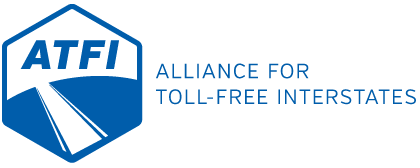The Alliance for Toll-Free Interstates (ATFI) is a grassroots group formed to educate the public about the negative impacts of tolling and advocate against public policy that would toll existing interstates. We believe the Connecticut General Assembly’s pursuit to expand tolling in the state is misguided. We urge to the Connecticut General Assembly Transportation Committee to reject all efforts to expand tolling in the state, including four bills before the Committee today: SB 389, HB 5046, HB 5391 and HB 5395.
Many Connecticut lawmakers have made troubling statements about the financial benefits of tolls. Tolls are designed to generate revenue. That is not in doubt. However, we believe the Committee must ask if tolling is the best use of taxpayer funds. If the Committee looks at other states, we believe any lawmaker concerned with fiscal responsibility and social equity will reject tolls in Connecticut.
First, the data clearly shows that tolls divert traffic. For Connecticut, all of this traffic diversion will force hardworking commuters to decide if it’s worth adding time to their commute everyday rather than pay new toll taxes—essentially creating a two-tiered transportation system between the rich and poor. Wisconsin has considered tolls over the last several years and has already paid for a study on the issue. Wisconsin’s 2016 study estimated 15-27% of drivers will drive around new tolls. Similarly, a 2013 study for the North Carolina Department of Transportation on the effects of tolls on Interstate 95 predicted that tolls would divert up to 36% of traffic to alternate routes. These vehicles will create new local traffic, increase accidents, slow first responder times and rapidly deteriorate secondary roads. In Yonkers, NY, the City Council is requesting that Governor Cuomo eliminate a $1.25 toll at the Interstate 87 border with Greenburgh due to toll evaders clogging local streets and directly causing one to two accidents monthly. Tolls cause major safety issues for adjacent, secondary roadways.
Second, evidence shows that tolls waste taxpayer funds. Wisconsin’s 2016 tolling study found that, due to administration and collection costs, only 77 cents of each dollar collected by tolls would go to the roads themselves. Even with extensive use of all electronic tolling, the New Hampshire Turnpike estimated 2015 operating costs of 10.6%, which did not include enforcement costs or depreciation of the tolling infrastructure. Rather than waste money on tolls, major DOT reforms are needed to reign in state funding of local transit programs which go largely unused.
Finally, tolls put power and money in the hands of contractors and corporations, not taxpayers. In Virginia, dynamic toll pricing has regularly reached more than $40 for a one-way, 8-mile stretch of privately operated toll road opened December 2017. The Commonwealth could be forced to repay a $579 million upfront concession payment if they seek to alter the terms of the toll contract to control costs. On another Virginia toll road in 2015, private operator Transurban sued thousands of drivers in court, attempting to collect civil penalties of up to $1,000 for every unpaid toll. One driver was sued for $31,000 over less than $500 in unpaid tolls. Tolls take money from hardworking Americans and give huge profits to toll road investors that should be going toward road repair.
Placing tolls on existing interstates will cause traffic diversion, hurt everyday drivers, and waste taxpayer dollars. Any effort to make tolling easier is an effort to hurt Connecticut’s future. Other states have shown that tolling is a failed policy with exponential consequences. ATFI urges the Committee to reject any and all bills that seek to expand tolling and instead focus on effective, sustainable solutions.
We thank the Committee for their efforts to resolve the state’s transportation problems and will be happy to answer any questions.

